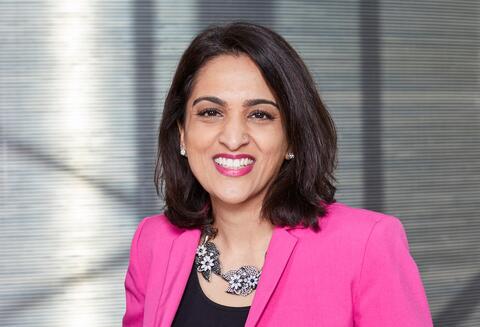
Written by
Published
Category
Key topics
The platforms on which they teach are changing, but the role and responsibilities of business schools are the same as they have been for 200 years
I enjoy being forward-looking, so let me talk to you about the spinning jenny. Until about 1764, if you wanted to weave something, you could only work one spinning wheel at a time. But with James Hargreaves’ creation of the spinning jenny, suddenly you could work 10 wheels at once. Productivity went through the roof, the price of yarn went through the floor, and Hargreaves went into hosiery. All across Great Britain, similar breakthroughs were being made in the mechanisation of the labour force. It was the Industrial Revolution, a defining period of our economic history.
But what did it actually mean? How did those mills change productivity, organisational models, the job function of the average swineherd? As these huge strides were taken in the functioning of world economies, there was a demand for new disciplines of academic thought: the world needed people who understood management, economics and policy.
Hello.
And the role of the business school in society hasn’t really changed. If anything, its role as an interpreter of how business and society are evolving in the face of technical change is more important now than it ever was. Today, a 22-year-old on Old Street can come up with some new bit of technology, someone else can run with it and – before you know it – a business model that has stood for 150 years has been undercut.
Jobs are being massively impacted by digitalisation.
Take accountancy: it’s an industry with a huge amount of repetitive work, but repetitive work that has until recently been too complex to hand over to computers. Now, however, major firms are looking at using drones to conduct audits, artificial intelligence to evaluate credit information, and machine learning to recognise financial irregularities.
But there is wider disruption of organisational structures going on: look at healthcare. With people ageing and new technologies coming online, formerly fatal diseases are becoming chronic conditions that stay with a person for 10, 15 or sometimes even 20 years, often interacting in significant ways. As a result, it’s increasingly the case that you don’t just have one doctor treating one patient for one condition anymore: you have teams of doctors working together to achieve particular health outcomes for given patients.
That means a whole different way of organising hospitals. Clearly there’s a medical side to that, but what about processes? What about managing teams? What about information architecture? All of that is much closer to the problems and issues business schools can tackle.
It is still the responsibility of the leading schools to create that rich, interactive experience – it’s just that now they are going to be curating it differently
And that’s not just in terms of our research, but also our teaching. If digital transformation is making work increasingly distributed and collective, that means your Organisational Behaviour class should be preparing the students to understand and make decisions in the context of collective work, your Strategy class should be talking about what it means to develop open distributed strategies.
A leading business school makes a difference through the learning environments it is able to create: the quality of the students as well as the professors, but also the degree to which the professor is at the frontier of knowledge in their area, the pedagogy, how well they understand the learning goals, how creative they are in engaging their students, and how she or he is connecting the class to the broader business and social environment.
I don’t see that being any different as teaching becomes increasingly digital. It is still the responsibility of the leading schools to create that rich, interactive experience – it’s just that now they are going to be curating it differently. If they are going to have group discussions, how are you going to set up teams? How are you going to manage that discussion? How are you going to create meaningful interactions around the topics in a world mediated by digital platforms?
That still creates limitations on group sizes: you couldn’t have a meaningful discussion about Winnie-the-Pooh if there were 1,000 people in your book club, so why would you be able to have one about digital disruption? Perhaps you could try dividing your 1,000 book club members into 100 groups of 10, but then you would encounter the challenging task of finding 100 group leaders to organise and guide the discussion. There is a place for Massive Open Online Courses, but without sufficient teachers to guide the students they will be a more one-sided learning experience; extremely valuable for somebody, and very well curated and thought out, but very different to the one we are creating at Imperial Business School.
There is an onus on schools to develop education technology in line with the digitalisation of the wider economy
There is an onus on schools to develop education technology in line with the digitalisation of the wider economy. At Imperial we are doing just that with our Edtech Lab ; global businesses often work with teams spread around the world, working digitally, and so that’s how we organise both our Global Online and Executive MBAs. Digital technologies don’t just change the teaching structure and dynamics: if carefully crafted, they have the potential to enhance the learning experience in important ways. Courses become multimedia, more personalised and more interactive, providing students with great feedback. Big data will also play a role, illuminating the learning process for both teachers and students, and giving us insights into how learning can best be designed.
Education is going to be a continuum between the extremes of digital and physical learning: the nature of the programme and the nature of the learning involved are going to be much more important in determining where your experience sits on that continuum than the quality of the school or its location. If you are young, still in a formative stage, the immersive social dimension (networking, cohabiting, and living your life alongside your peers) is still going to be a very important part of the learning experience – developing deep personal relationships isn’t the same online and neither are the pubs. A school may ‘flip’ the classroom experience (so you do the reading online beforehand) but you will still spend much of your time on campus.
If, on the other hand, you are a busy executive, pressured for time, then travelling, being away for a long time, or being in classrooms for many days is going to be virtually impossible; you’re going to be doing much more learning remotely and with limited engagement (although I can think of a few students who’ve managed that while sitting in my classroom). Through video conferencing and remote working, many potential students are already skilled in working in a ‘blended’ format and prefer to study in that way – so it should not be surprising business schools offer it to them.
Business and society are changing very quickly. We’re in the middle of the Digital Revolution. What do the scientific and technological advancements coming out of places like Imperial London actually mean for the world? You need researchers and teachers with the insight and understanding to investigate and explain the effects of all that. Just as you did with the spinning jenny.


